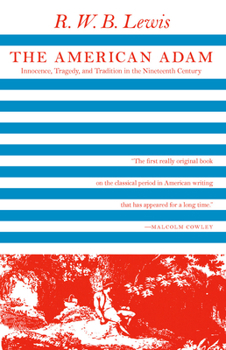The American Adam: Innocence, Tragedy, and Tradition in the Nineteenth Century
Select Format
Select Condition 
Book Overview
Intellectual history is viewed in this book as a series of "great conversations"--dramatic dialogues in which a culture's spokesmen wrestle with the leading questions of their times. In nineteenth-century America the great argument centered about De Cr vecoeur's "new man," the American, an innocent Adam in a bright new world dissociating himself from the historic past. Mr. Lewis reveals this vital preoccupation as a pervasive, transforming ingredient of the American mind, illuminating history and theology as well as art, shaping the consciousness of lesser thinkers as fully as it shaped the giants of the age. He traces the Adamic theme in the writings of Emerson, Thoreau, Hawthorne, Melville, Henry James, and others, and in an Epilogue he exposes their continuing spirit in the works of F. Scott Fitzgerald, William Faulkner, Ralph Ellison, J. D. Salinger, and Saul Bellow.
Format:Paperback
Language:English
ISBN:0226476812
ISBN13:9780226476810
Release Date:September 1959
Publisher:University of Chicago Press
Length:208 Pages
Weight:0.51 lbs.
Dimensions:0.5" x 5.3" x 8.0"
Customer Reviews
1 rating
A little outdated, but a great read nonetheless
Published by Thriftbooks.com User , 20 years ago
In The American Adam, R.W.B. Lewis traces the Adamic myth through American discourse, thought, and literature during the period of 1820 to 1860, presenting different interpretations of America's national identity and examining the dialogue they produced. The fundamental myth at hand, that of the authentic American as Adam, posits "an individual emancipated from history, happily bereft of ancestry, untouched and undefiled by the usual inheritances of family and race; an individual standing alone, self-reliant and self-propelling, ready to confront whatever awaited him with the aid of his own unique and inherent resources" . Lewis examines several incarnations of this Adamic figure and addresses the philosophical, theological, and cultural implications of the nascent American mythology. In doing so he combines an analysis of historical trends with the close reading of various representative literary texts, nearly all of which treat the theme of American individualism or question the principles behind it. Of course, there are multiple ideologies to consider as this picture unfolds. Lewis adopts Ralph Waldo Emerson's terminology for the two opposing groups-the party of Hope and the party of Memory-and introduces his own, that of Irony, to include those individuals who situated themselves between the two extremes. The debate between these three camps would refine and polish the Adamic ideal, transforming it from an adolescent fantasy into a full-fledged American myth, thus discovering its redemptive power and creating some of the finest American literature to date. American exceptionalism may be harder to defend than it once was, but Lewis's analysis of the Adamic myth retains its relevance as a classic text in American literary theory. Furthermore, the author has a clear, rich, engaging style of writing that makes for both intellectual and aesthetic enjoyment. I would strongly recommend this work to all students of American literature; if you're not that taken with American lit., however, you'd be better off passing this one up. In other words, The American Adam is an excellent, thought-provoking book, but it's likely to only appeal to students of the field. Five stars all the same.





